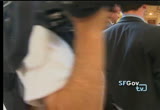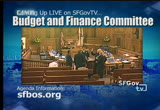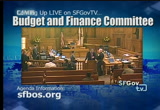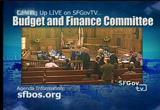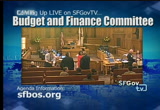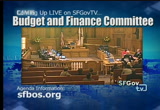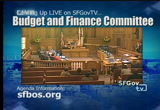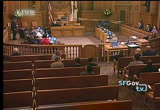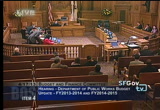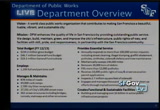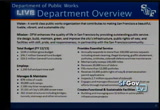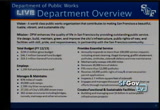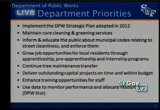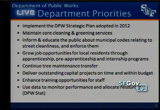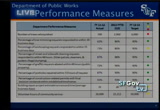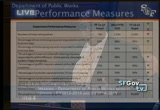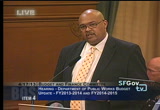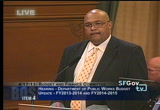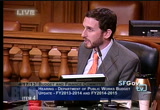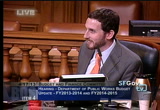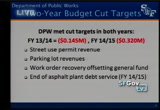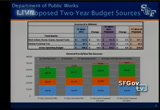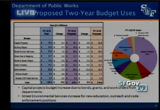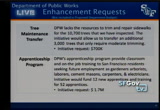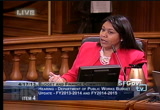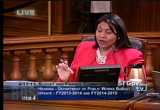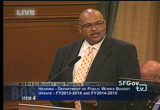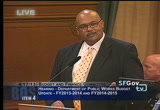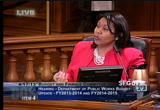tv [untitled] April 17, 2013 1:30pm-2:00pm PDT
1:37 pm
1:38 pm
mar, vice-chair, also supervisor john avalos, supervisor london breed, and supervisor scott wiener. i would like to thank the members of sfgtv covering this meeting today, greg burk and jennifer low as well the clerk of this committee, victor young. do we have any announcements? >> yes, please turnoff all cell phones and electronic devices. completed speaker cards and any documents to be included as part of the file should be submitted to the clerk. items acted upon today will appear on the april 23rd, 2013 board of supervisors agenda unless otherwise stated. >> all right, mr. clerk, we're going to do a few at least one item out of order here. can you please call item number 4? >> item number 4, hearing to receive an update on the department of public works budget for fiscal year 2013-2014 and fiscal year 2014-2015. >> all right, thank you very much. we have mr. [speaker not understood], our director of public works to present. >> good afternoon, supervisors.
1:39 pm
okay, thank you. to present our budget overview for next year, i have a few slides and i believe you have the presentation before you. the vision of our department to continue to provide world class public service. we contribute to making san francisco a beautiful, livable, and vibrant and sustainable city. that's of course our mission is to enhance the life quality of life in san francisco by providing service through public service. we build, we maintain, we improve the city's
1:40 pm
infrastructure, right-of-way, and we are very -- consider ourselves a very responsive department in partnership with other city departments in the san francisco community. the slide before you, you can see our budget for 2012-2013. our gross budget was $194.3 million. of that, 46.7 was general fund, 19.3 was general fund subsidy. we employ about 1200 people in the department both full time and part time. some of the things we do, we maintain over 800 miles of city streets, 9,000 curbs, 22,500 receptacles, 37 -- over 37,000
1:41 pm
street trees, over 500 street trees on the city's right-of-way, and 362 structures. that includes many of our stairways, our bridges, tunnels, and other structures. the department's essential services, we respond to over 100,000 311 calls every year for street cleaning, illegal dumping, graffiti abatement, potholes, tree maintenance. we mechanically sweep over 146,000 miles of street, remove over 30,000 tons of debris on the streets of san francisco, and fill over 12,000 potholes. we inspect over 2.7 million square feet of sidewalk and we engage and manage thousands of volunteers to help us keep the city clean.
1:42 pm
and through many of our community programs. we also are responsible for implementing and managing over $3 billion of many of the city's active public infrastructure projects which are mostly in the form of bonds. what are the department's priorities? in 2012 we adopted a three-year strategic plan, strategic plan we use to guide the department in accomplishing our mission. we track our strategic plan very regularly and see how well we're doing and where we're on track. also, our priority to maintain core cleaning and greening services when iction the city and county of san francisco. ~ within a lot of effort is put into working with the public educating them about municipal codes as it relates to street
1:43 pm
cleanliness and enforcement. we also in the department created several apprentice programs that have been providing job opportunities for many of the san francisco residents, but also opportunities for internships both apprentices and pre-apprentices. we continue our tree relinquishment process, relinquishment process started last year. and as you remember, if you recall, it's about a six-year process. i'll elaborate a little bit more on it, but that transfer process, that continues. ~ and we also continue to deliver many of our transfer projects on time at this time and within budget. within the department, and this is part of our strategic plan,
1:44 pm
we have provided staff opportunities for extra training and making sure that staff take classes that enhance their work and bring them up to speed with current trends. we use data on a very regular basis to track our performances and allocate our resource he accordingly. both for the operation side of dpw and in general [speaker not understood] also. our performance measures were indicators, as you can see. where we are struggling the most is in the number of [speaker not understood] relinquishments, that's the red that you see. other than that, i would say the other two areas to look at are the turn around estimate times for some of our projects where last year we set goals
1:45 pm
pretty high and we have exceeded last year's goals but we haven't reached the goals that we set for ourselves. and also a number of committees, volunteer hours that we have asked a number of community groups and residents to get involved in. the other area is our response to landscaping. in 11-12 our response was 73%. we are at 80% right now, and our goal is to get to 90%. >> mr. mohammed, can you talk real quick about the red area, number of trees relinquish, we spoke about that before the hearing. maybe you can explain that in more detail. >> okay. within the city's right-of-way there's about 105,000 street trees. roughly 105,000 street trees, the department currently has about, i would say, about 40,000 street trees. ~ of the 105 efficient the remaining of those street trees are maintained by property
1:46 pm
owners. the 30,000 the department has included both department trees, other agency trees and some property owner trees. we started the process of relinquishment of trees, the number of trees that are not owned by the department is approximately 23,000 trees. and, so, we have planned to relinquish those 23,000 trees by starting with 6,000 in last year's budget, and thereafter 3,000. until relinquishment completed. ~ the process of relinquishment involves where the tree gets inspected, and to transfer a tree to another department or to a property owner, the tree has to be made whole. that means it has to be pruned and the sidewalk has to be fixed. in that process, we have inspected over 11,000 of those trees. and of the 11,000, only about 2000 are ready to be relinquished. that means that we need to go
1:47 pm
back and make the tree whole so that we can transfer them. apart of our initiatives, we have an initiative to request funding for low-hanging fruits, trees that will cost probably between 5 and $800 to prune. and then we can transfer. there are about 3,000 trees in that request. >> so, i know a number of proposals are being worked on regarding our trees. but i think the point is for constituents that call and so forth, to the extent we give over trees to local san francisco residents, they are in good shape, the sidewalk is in good shape. we're not going to happened it over with a ton of work to be done on them. >> that is the way article 14 of the public works [speaker not understood]. >> supervisor wiener. >> thank you. i just want to follow-up on that. i know supervisor avalos and i have been working very hard to see if there is anyway that we can actually fund healthy urban
1:48 pm
forests in our city because we, because of budget decisions made over many, many years, we have made ourselves unable to do that. dpw has a phenomenal urban forestry section, but we have absolutely decried that section of the ability to do what it immediatex to do to care for all these trees, which results in relinquishment placing the responsibility for tree maintenance on property owners who may not have planted the tree, may not want the tree, may not have any idea how to take care of it, may not have the financial wherewithal to take care of it or the physical capacity to particularly if they're disabled or seniors. it's a terrible system we set up. i say we because it's policy makers in terms of the mayor and board of supervisors in terms of how to fund this. just to be clear, you were
1:49 pm
extremely diplomatic in the way that you said this as you always are. i want to be a little more blunt about it. we have made a conscious decision in city hall not to fund street tree maintenance and instead to turn over responsibility to property owners. in order to turn it over, we have to make sure that the tree is fixed up and any sidewalk damage is fixed so that we're turning over something that's not defective. but dpw did not actually have enough resources to fix all of that sidewalk and those trees in order to turn it over. so, we have decided to turn it over in order to have property owners care for them. but we don't even have the financial capacity to put ourselves in a position to turn the trees over. did i get that right? >> that's accurate. >> okay. i think that is just -- it's just awful and we have -- it's been frustrating for me just in the couple years i've been on
1:50 pm
the board to see how poorly trees fair in the budget process. and the fact it we can't even pursue the bad policy of relinquishment because we don't have enough money to fix up the trees to turn them over is just -- it's almost like a saturday night live skit about what's wrong with our urban forestry program. so, i give dpw all the credit in the world for doing everything it can do, but i think it's incumbent on this board and on the mayor to make sure that we're giving you enough resources. >> thank you. >> continue. >> so, our two-year budget cut targets, 13-14, we met our target for both years and next year through our street permit revenue process. we have some parking lots that provide some revenue. so, work order recovery offsetting some of the general
1:51 pm
fund allocation. and we ended the debt service for asphalt plan. it's no longer in service. looking at the two-year budget, of significance there is our general fund. we have several bonds that the department is working on. we have several work orders and special funds. 2012-13 it was 147.6. the change is 14.1. and that is primarily due to bonds, hiring staff to accomplish the work that needs to be done. and you can see going through 13-14 what the change is. so, 14-15 is 167.1. the same thing with general fund and gas tax, the bulk of
1:52 pm
that is mostly cola payments and cop debt service subsidy. that will take you to the next slide that actually shows what that debt service is. the budget increase is due to the revenue growth. in the year 13-14 our proposed general fund subsidy is higher than the 12-13 by -- that is 1% less than the baseline of the budget cut. so, in short, we met our target cut that we were at in the budget process. next slide shows how we use our budget. by the various parts of dpw, the -- about 37% of our budget is in capital projects and the next largest is street environmental services which is about 17%. and then we have a few other
1:53 pm
bureaus, building repair bureau, urban forestry, street mapping and street and sewer repair, those are between 8 and 12%. and then, of course, you can see our administration is 12%. administration does cover many of the department functions, both bookkeeping, finance, computer staff and the running of the day to day agency. and [speaker not understood] requirements, we talked about tree maintenance. tree maintenance, as you can see, the initiative is a request for about $700,000 to transfer an additional 3,000 trees. as you heard from supervisor, we currently do not have any funding to transfer any tree
1:54 pm
that needs any extra work. so, trees that are being transferred are trees ready to go. >> to be clear, the tree maintenance transfer in the program are not in the budget you set forward right now submitted to the mayor's office? >> that's right. that's right. and, so, the other request -- >> excuse me. supervisor breed. >> [inaudible]. excuse me. they're not in the budget because of the system that was set up to try and charge residents to maintain their own trees? >> no, it's an initialtive for us to be able to get the fund to be able to provide the service. ~ initiative so, we don't include initiative in the budget. >> okay. is there a way -- and i'll just basically say i know that this -- i don't know how long ago. supervisor wiener brought up the point about how trees are now an option to fund tree
1:55 pm
maintenance and how it's in some ways the expense is shifted to the homeowners, which i know has been a challenge. it has been the challenge, i think, because one of the experiences i have, our people who may be homeowners who don't necessarily even have the money to maintain and take care of their own properties. and in some cases, i think they've been given bills, dpw if possible, is able to come and maintain the tree because of maybe safety hazards or other things. and people are billed, am i correct, for that, and they're taken by surprise with those kinds of things. and i notice that there are a larger number of limbs that are kind of broken and fallen apart all over the city because of wind and other things we experience, a lot of issues, if this program were supported in
1:56 pm
the way it should be supported, regardless of residents, it could be -- a lot of these things could be prevented. am i correct in saying that? >> yes. ideally, it makes sense for the city to maintain the trees in the right-of-way because then we can set cycles and we can perform the maintenance that's required. due to not having enough resources, we now of the 105 street trees that are in the city's right-of-way, over 60,000 are maintained by property owners and the department has got a team of tree inspectors who work with property owners and advise and guide. so, the remaining -- not remaining. the number of trees that the city is looking after that currently belong to property owners also. so, i think to get a level playing field, we should be
1:57 pm
really pushing those trees to property owners. because what we have in the city now is some blocks are maintained by the city and other blocks are maintained by property owners. and like i said earlier, ideally, it makes sense for the city to maintain everything, but we don't have enough resource he. so, i'll give you an example. the last five days all our arborists and a good number of our laborers, due to the high winds, we had over 100 trees down. in a fighting mode. those five days are not being used maintaining the current city stock. so, at one time we were able to get to a tree every 7 years. we are looking leak 10 to 11 years now. as we reduce our resources and have to maintain the trees, the cycles become longer. that means the maintenance becomes more needed and that means the tree could be more of a hazard. so, we're trying to figure this
1:58 pm
out. a number of supervisors have been working with us. but on the city side is just -- the resources are just not there. >> i'd be interested in knowing -- and i know this isn't in your upcoming proposed budget, but i'd be interested in knowing the level of support necessary in order to be more efficient. i realize that there should be property owners who are maintaining their trees because they do have the resources to do so. but there are a lot of other neglected properties for various reasons. and i want to make sure that the city is being responsible, especially because the neighborhood beautification, we're encouraging people to plant trees, but not necessarily communicating to people once these trees are planted what the responsibility of maybe the property owner or the city might be in terms of the increased responsibility. and, so, that's one of the issues. the other issue i know with development, there's a lot of
1:59 pm
requirement around trees. i know what we're dealing with i in a large part of district 5, a lot of older trees that are creating sewage problems and other things which i experienced personally at the african-american art can culture complex, unaware of the way the roots were growing in the pipes which created a real serious flood in our theater. and i know there's, you know, a number of other hazards which impact accessibility throughout our city and there's a whole process, even, to remove a tree for even accessibility purposes. so, i do think that we're continuing to increase our capacities of the number of trees that we plant throughout the city, while not necessarily maintaining and taking care of the existing stock. i'd like to see us continue to move in that direction, but just to really look at a realistic plan of maintaining what exists and dealing with more prevention if at all possible. wh
45 Views
IN COLLECTIONS
SFGTV: San Francisco Government Television Television Archive
Television Archive  Television Archive News Search Service
Television Archive News Search Service 
Uploaded by TV Archive on

 Live Music Archive
Live Music Archive Librivox Free Audio
Librivox Free Audio Metropolitan Museum
Metropolitan Museum Cleveland Museum of Art
Cleveland Museum of Art Internet Arcade
Internet Arcade Console Living Room
Console Living Room Books to Borrow
Books to Borrow Open Library
Open Library TV News
TV News Understanding 9/11
Understanding 9/11